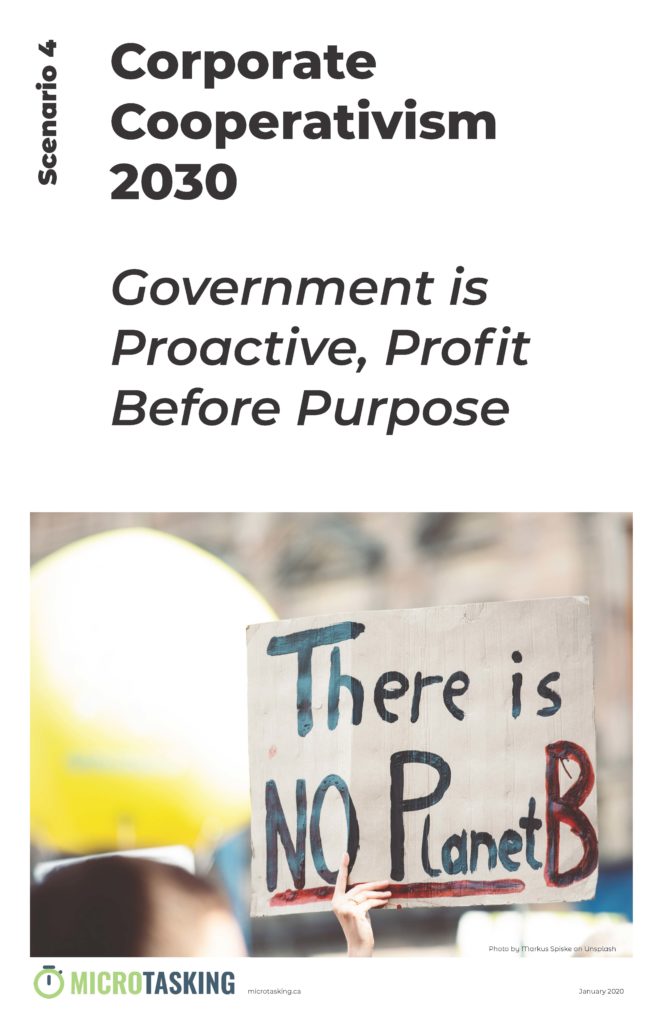
Scenario 2: Profitably Public
Government is proactive + purpose-driven profit
In the Profitably Public scenario, government is proactive while corporations compete for social reputation. Rising global tensions built consensus for sweeping, conscientiously capitalist reforms. Corporate tax hikes support measures like greater privacy protections, which in turn unlock personal data‘s full commercial value. New social tech and norms boost ethical consumption. And all these forces are reshaping Toronto. Changes are visible everywhere, from ag-tech complexes to hallucinatory popup nightspots — if you can afford the social impact offsets to get in.
Scenario 2 was developed at the microworking session held on December 10, 2019. The related persona is Alyx Lee.
“Your capitalism’s not working? Have you tried resetting it?”
The world is swimming in data — or maybe drowning.
AI accelerates advances. It supports increasingly complex systems, from social networks to population biomonitors and satellite clusters. But these technologies also concentrate control, raising social inequality and tensions. Overlapping national and corporate interests jockey for global influence. They cooperate on problems like climate change one minute, then trade cyberattacks the next. Local extremists feed on global tensions.
These dynamics played out in the last decade’s interlocking crises. Ageing populations and new pandemics strained public medical systems. Falling pension contributions and tax avoidance weakened social safety nets. Precarious workers regularly fell right through.
Unchecked markets hardly seemed an attractive alternative, though. Monopolies tightened and wages stagnated. It was also a decade of dramatic data breaches and abuses. Anxiety rose over digital annexation, whether by Silicon Valley or Beijing.
A mandate to upgrade government
All this left Canadians increasingly willing to take political chances. Hope grew that a more conscientious capitalism could deliver humane innovation. But this required government smart enough to keep citizens informed and empowered.
Consensus grew across parties and levels of government that serious investment was necessary to update public institutions for the algorithmic age. Ideas like “data sovereignty,” “privacy as a utility” and “digital social democracy” shaped public agendas.
Governments bargained hard with scandal-weakened corporations for access to Canadian markets. But they also worked to ease costs, by making digital markets far more efficient.
The resulting experiments are reshaping Toronto’s civic, economic and social life. And all these changes are on vivid display in booming microwork markets.
Deals for dollars & data
Legislators redesigned social programs for a world where most people have several employers. Hourly contribution and entitlement requirements softened, making company staffing more flexible. Widespread HR and accounting automation have lightened any regulatory burden. But citizens also have easier access to benefits.
All this depended on new revenues, supported by international reforms. These helped more fairly identify and tax corporate revenues, preventing profit sheltering. Streamlined CRA filing and a Canadian e-currency launch have simultaneously lowered everyone’s transaction costs. And all this has helped keep tax rates down, by increasing collection efficiency.
Similar compromises allowed ambitious data governance reforms. These took sensitive details about Canadians out of private hands. But the resulting data pools also provided significant social and economic value.
Governments have unified management of citizens’ medical, tax and demographic data. The gains here go beyond internal efficiency gains. Easy access to data has increasingly become a public service. Microworkers, e.g., can digitally verify their identity, medical or police records for potential employers.
Projects like Sidewalk Labs’ Quayside development likewise spurred greater attention to citizen information. Canadian governments worked with companies like Element AI and ThinkData to pioneer new approaches. Then increasingly, privacy laws mandated using independent data trusts to protect sensitive personal information.
Making a market for morality
Policymakers also pushed for more transparency about companies’ social and ecological impact.
This model developed out of already widespread, evidence-based impact standards. These ranged from carbon accounting to public benefit corporate legislation and certification. Such measures also mandated availability of significant details on worker conditions, pay and demographics.
Many companies were already collecting such data for internal or insurance analysis, which smoothed transition. Now they just had to audit and publish it, in proportion to their Canadian business.
Such information let people compare major companies’ actual impact, not just branding. This helped take social impact from consumer niche to mainstream business priority. It now significantly affects consumer choice.
That’s partly due to urgent concerns like climate change. Yet it’s also boosted by new shopping analytics services. These filter and sort purchase options in real-time, by personal priorities. Pulling now-available impact data from a product’s whole supply chain, they make “the right thing” clear. So customers do it more.
Such tools also help people track their own total impact. Services then combine such consumption and financial records with sources like home and transport data. The result are blended personal “moralytics” scores. These are everywhere now. Spread through social sharing and gamification, promised insight into people’s true selves drives integration with dating apps and other services.
This positive social feedback loop drives further ethical consumption and disclosure. It’s also spawned many new offsetting services. So even conventional companies now compete on purpose-based metrics, to improve profits.
That’s partly because corporate reputation has only become more important when competing for idealistic young talent. All of which means even the most hard-nosed investors increasingly factor social impact into their decisions.
Earning a microliving in 2030 Toronto
Together, all these developments have fostered not just more microwork opportunities but far more profitable ones. And this has fuelled a remarkable Toronto boom.
Conventional employers are certainly crowdsourcing more jobs. But Canadian digital workers also command premiums for their accurate, micro-targetable qualifications. Marketers have also built on longstanding practice by assembling test panels of Canadian consumers to match any target demographic. And demand is rising for higher-skill microlabour. Experts from plumbers to dermatologists offer remote consultations via new platforms.
New privacy protections also let individuals control and profit passively from their own information. Personal data streams are increasingly detailed and useful. And combined with tough privacy laws, this encourages organizations and businesses to offer direct payment for access.
But citizen trusts also increasingly control massive pools of value, from genomic and facial recognition data to personal social graphs. Members can then opt into uses they approve. Options range from public-interest research participation to (paid) studies and ad targeting. Combined, passive personal and group data licensing gives citizens a basic (market) income.
Many combine microwork’s flexibility with care, community and cultural work. Workers can plan better, and proliferating platforms drive competition for labour. Given reduced policy incentives for worker misclassification, platforms also foster more worker coordination. This increases both effectiveness and work satisfaction.
Microwork is now commonplace in mainstream media and culture. As ever more jobs turned into gigs, popular awareness and sympathy grew. All of which helped secure legislative protections.
TO residents have also founded several successful microwork platform startups. Skilled, specialized and secure micro-labour has likewise helped sustain the city’s broader AI cluster.
Such shifts have also reshaped the city’s human geography. Toronto supports an extensive system of shared workspaces, for instance. And transportation systems are far less strained.
Absolute economic disparities are even greater than in 2020. But digital workers can favour factors like housing cost over workplace accessibility. Virtual commutes also make it much easier for lower-income residents to resettle in more affordable communities. This has eased pressures by reducing population flows into Toronto. They’re sometimes even reversing, helping revitalize smaller Ontario communities.
Critical events
2020-2030: Profitably Public
To develop the profitably public-focused scenario, the group established the critical events that might take place should the government take a proactive role, and corporations reverse direction to purpose-driven profit.
- 2020: Anonymous dump of the Midtown Memos, records stolen from a white-shoe NYC firm. Partners there discreetly helped tech giants bury scandals, skirt regulation and “minimize” taxes. Most suspect foreign state hackers, but they’re never identified.
- 2021: Launch of global transmedia phenomenon Strange Company, Brazil’s first “ultranovela.” It combines dozens of reality-style narrative feeds with an alternate reality game. The public joins in by completing tasks on a cryptic microwork platform.
- 2021: A ProPublica/Australian Broadcast Corporation investigation reveals funding of China’s Uighur detention camps with forced micro labour. Such digital abuses soon explicitly added to Canada’s Modern Slavery Act.
- 2021: Midtown Memos revelations fuel OECD-wide reforms to tax corporate revenues more effectively.
- 2022: Minneapolis serial killer’s arrest leads to public panic over Orthodoxx. This dark-web service allows the simple search (and purchase) of detailed personal information. Details for millions came from combining and deanonymizing legal data brokerage offerings.
What events trigger this change?
- 2023: Outbreak of the virulent H7N13 flu pandemic. This pushes many strained health systems to break. Also, it reminds survivors how much collective action can matter.
- 2025: Passage of Canada’s omnibus federal Data Sovereignty and Protection Act. It includes major provisions for business impact transparency.
- 2027: Announcement of sustained over-benchmark returns for Human Ventures, a major impact-oriented fund. Investors range from OMERS to Jeff Skoll.
- 2028: Nature publishes the first major findings from Canada’s Public Pool genomic data trust. Commercial applications promise significant licensing returns for trust participants.
- 2029: Toronto success story Klutch closes their buzzy Series C funding round. The startup built a marketplace for taste, offering AI-powered polling of people like the ones users most want to impress.
Contributors
This scenario was written by Alastair Cheng. It was developed based on the contributions of the following people at the Microwork Drivers Workshop held December 10, 2019.
Yasmeen Awadh
Jonquil Eyre, Consultant
Sukanta Goswami
Julian Posada, PhD Student, University of Toronto
Peter Stoyko, Chief Social Scientist & Information Designer, Elanica
Graham Westwood, CEO, Smashblock
Microtasking posters
Are you planning to hold a discussion on microwork? The posters make great prompts for your group.


You can download the full set of eight posters from the project toolkit.
Photo used to represent Alyx by Alekzan Powell on Unsplash
Sneakers and bike wheel by Marcelo Franchi on Unsplash
All scenarios
TORONTO 2030: TALES OF POLICY AND PROFIT
Persona 1: Robin Esposito
Scenario 2: Profitably Public
Persona 2: Alyx Lee
Scenario 3: The Social Impact Franchise
Persona 3: Vasil Ramadani
Scenario 4: Corporate Cooperativism
Persona 4: Dan Yoon
- Invisible Gigs: Researching Microwork in Canada - February 22, 2020
- Scenario 2: Profitably Public - December 21, 2019
- Persona 2: Alyx Lee - December 21, 2019


























